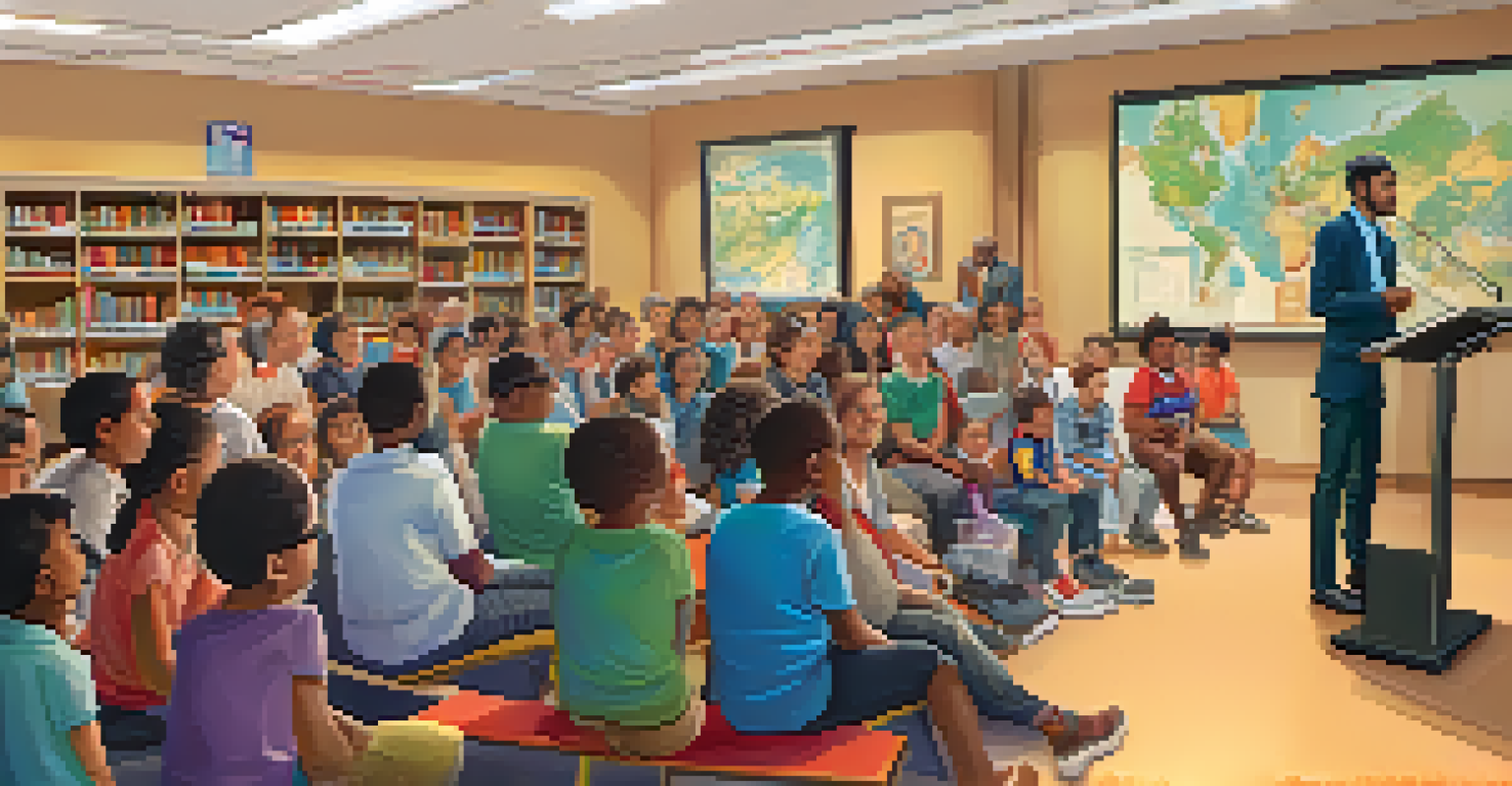The Role of Libraries in Fostering Civic Engagement

Understanding Civic Engagement and Its Importance
Civic engagement refers to the ways in which individuals participate in their community and government. This can include voting, volunteering, or attending town hall meetings. The importance of civic engagement lies in its ability to foster informed citizens who can influence decision-making and advocate for their needs.
The best way to find yourself is to lose yourself in the service of others.
When communities are engaged, they thrive. Active participation leads to better representation, improved public services, and a stronger sense of belonging among residents. This involvement can create a vibrant civic culture where everyone feels empowered to voice their opinions and contribute to the common good.
Libraries play a crucial role in promoting civic engagement by serving as accessible hubs for information and resources. They not only provide materials related to civic issues but also create spaces for discussion and collaboration among community members.
Libraries as Community Information Centers
One of the primary functions of libraries is to provide access to information. This includes resources on local government, civic rights, and public policies. By offering these materials, libraries equip citizens with the knowledge they need to engage effectively in their communities.

Moreover, libraries often host workshops and events that educate the public about civic issues. These programs help demystify complex topics, making them more approachable for everyone. For example, a library might hold a seminar on how to register to vote or understand local elections.
Civic Engagement Empowers Communities
Active civic engagement leads to better representation and fosters a sense of belonging among residents.
By becoming community information centers, libraries foster an informed populace that is more likely to participate in civic activities. This not only enhances individual empowerment but also strengthens the community as a whole.
Creating Safe Spaces for Civic Dialogue
Libraries are unique in that they provide neutral, safe spaces for community members to gather and discuss important issues. This is vital for fostering open dialogue, especially in diverse communities where differing opinions may exist. In these spaces, individuals can share their perspectives without fear of judgment.
In a democracy, the public has a right to know and libraries are the best place to share information.
Events like town halls, forums, or book clubs hosted in libraries encourage conversations about civic matters. These gatherings promote understanding and respect among participants, which is critical for a healthy democracy. When people come together to discuss their views, they learn to appreciate different perspectives.
By facilitating these discussions, libraries not only promote civic engagement but also build social cohesion. This sense of community is essential for effective participation in civic life, as it encourages individuals to take action together.
Encouraging Volunteerism and Community Service
Libraries are often at the forefront of promoting volunteerism within communities. They host volunteer fairs, connect residents with local service opportunities, and even organize their own volunteer initiatives. This involvement can spark a passion for service among participants.
By engaging in community service through library programs, individuals can see firsthand the impact of their contributions. This experience not only fosters a sense of accomplishment but also encourages participants to continue their civic engagement beyond the library.
Libraries: Hubs for Civic Learning
Libraries provide essential resources and safe spaces for community members to engage in civic dialogue and education.
Moreover, libraries can collaborate with local organizations to create meaningful volunteer opportunities. This partnership not only benefits the community but also strengthens the library's role as a vital resource for civic engagement.
Promoting Literacy as a Foundation for Engagement
Literacy is a fundamental skill that empowers individuals to participate fully in civic life. Libraries promote literacy through various programs, from reading initiatives to adult education courses. By enhancing literacy, libraries help remove barriers to civic engagement.
When individuals are literate, they can better understand civic materials, such as ballots or public notices. This comprehension is crucial for making informed decisions that affect their lives and communities. Libraries strive to ensure that everyone has the literacy skills needed to engage effectively.
Through targeted literacy programs, libraries play a vital role in creating a more informed citizenry. This focus on education reinforces the connection between literacy and active civic participation, making it clear that knowledge is power.
Leveraging Technology for Civic Engagement
In today's digital age, technology plays a significant role in civic engagement. Libraries are embracing this by providing access to technology and training on how to use it effectively. This includes everything from computers and internet access to workshops on social media and digital literacy.
By equipping community members with technological skills, libraries help bridge the digital divide. This access is essential for participating in modern civic life, where many discussions and decisions occur online. For instance, being able to navigate government websites or online voting registration is crucial for active participation.
Technology Bridges Civic Gaps
By offering technology access and training, libraries help bridge the digital divide and enhance participation in civic life.
Furthermore, many libraries are using technology to facilitate virtual discussions and events, allowing for broader participation. This adaptability shows how libraries are evolving to meet the needs of their communities and ensure that everyone has a voice in civic matters.
Building Partnerships for Stronger Civic Engagement
Libraries often act as connectors within their communities, bringing together various organizations and stakeholders to promote civic engagement. By collaborating with schools, non-profits, and local governments, libraries can amplify their impact. These partnerships can lead to innovative programs and events that engage more citizens.
For example, a library might partner with a local advocacy group to host a voter registration drive. Such collaborative efforts not only increase participation but also foster a sense of shared responsibility among community members. When different organizations work together, they can create a more cohesive and engaged community.

Through these partnerships, libraries position themselves as central players in fostering civic engagement. This collaborative spirit enriches the community and underscores the importance of collective action in addressing civic challenges.
The Future of Libraries and Civic Engagement
As we look to the future, the role of libraries in promoting civic engagement is more crucial than ever. With the rise of misinformation and social division, libraries can serve as trusted sources of information and community connection. They are well-positioned to address the challenges that threaten civic participation.
Innovative programs and services will continue to evolve, ensuring that libraries meet the changing needs of their communities. From digital literacy initiatives to community forums, libraries will remain at the forefront of fostering informed and engaged citizens.
Ultimately, the future of civic engagement hinges on the ability of libraries to adapt and grow. By continuing to emphasize their role as community hubs, libraries will help shape a more informed, active, and engaged populace for years to come.